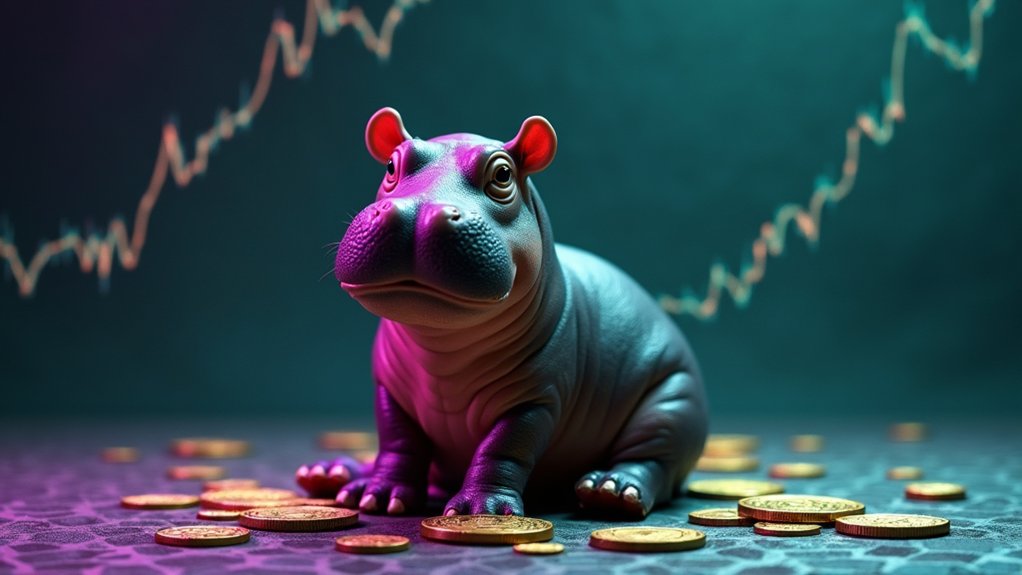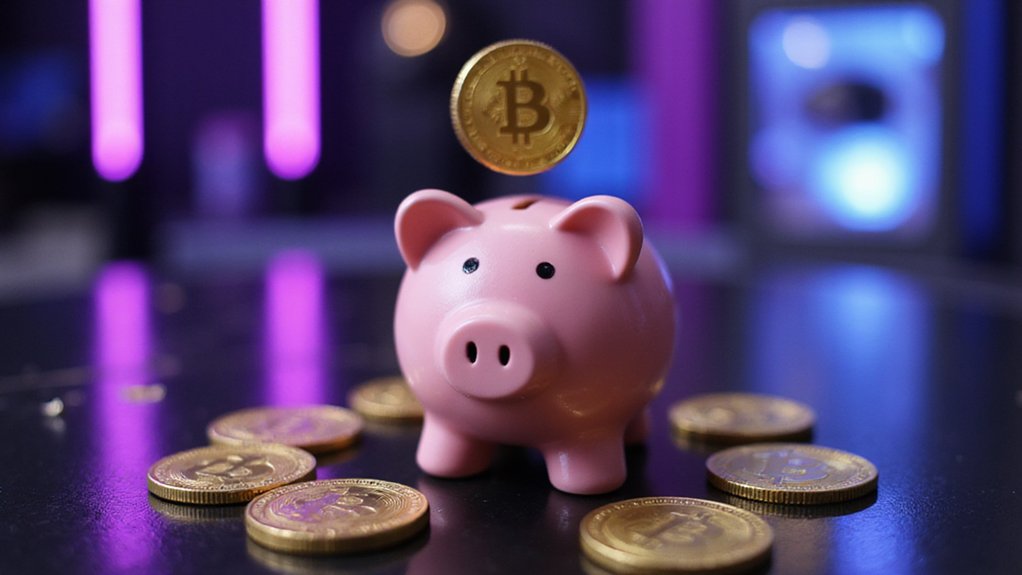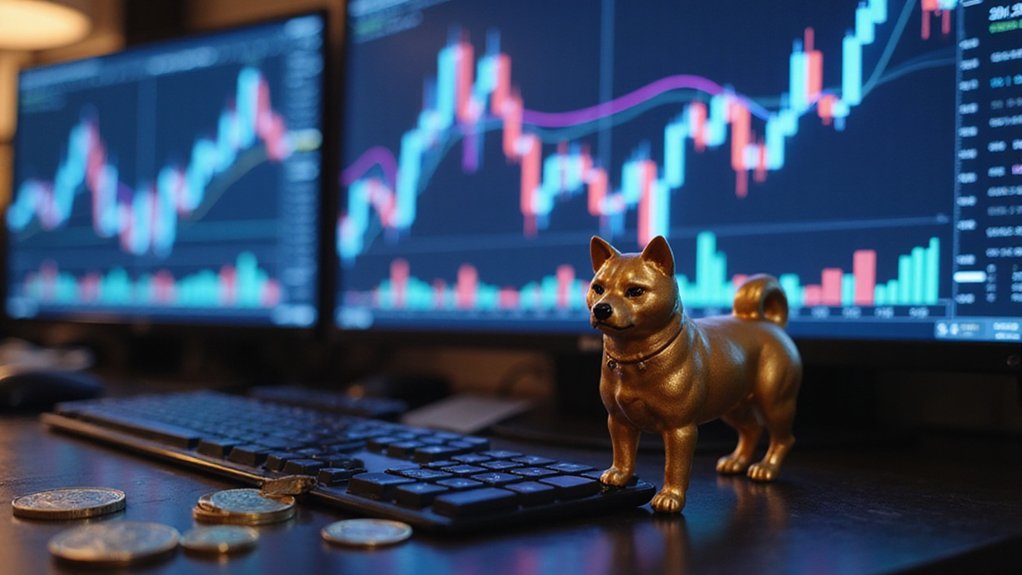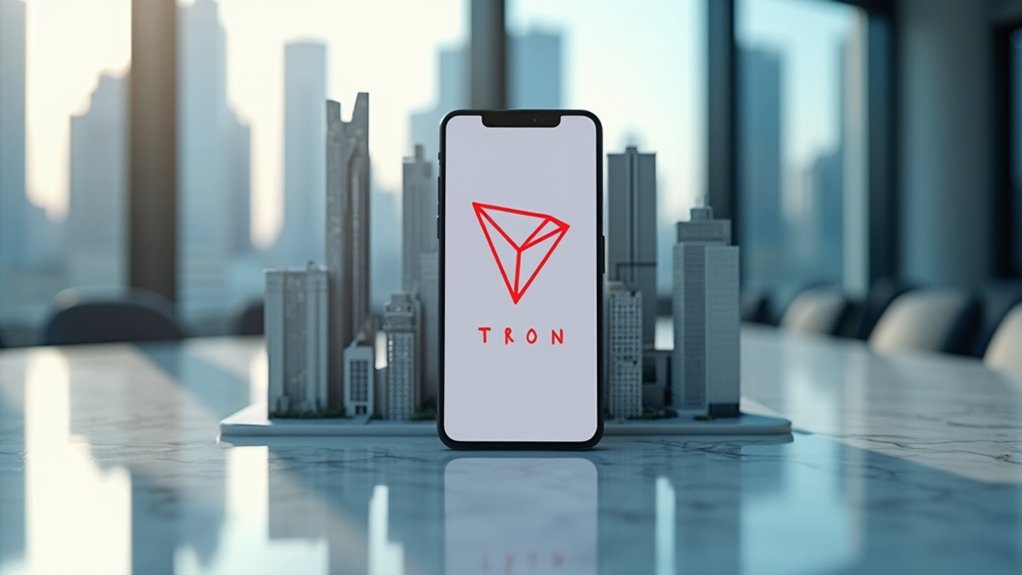MOODENG transforms viral pygmy hippopotamus fame into Solana-based speculation, featuring 989.97 million uncapped tokens trading without fees across decentralized platforms. This September 2024 launch exemplifies meme coin economics, where community enthusiasm for anthropomorphized creatures drives valuation—evidenced by May 2025’s remarkable 700% surge from $0.0409 to $0.32 within six days. Unlike purely extractive counterparts, transaction fees support Khao Kheow Zoo’s conservation efforts, distinguishing charitable utility from standard meme tokenomics while testing viral marketing’s asset-creation boundaries.

The meteoric rise of meme coins has birthed yet another unlikely digital asset: MOODENG, a Solana-based cryptocurrency that draws its inspiration from a rotund pygmy hippopotamus who achieved internet stardom at Thailand’s Khao Kheow Zoo.
Launched in September 2024, this token represents the latest iteration of speculative assets that derive value not from utility but from cultural resonance and collective enthusiasm.
Operating on Solana’s high-speed, low-fee infrastructure, MOODENG leverages the blockchain’s technical advantages while eschewing traditional cryptocurrency fundamentals.
The token maintains a capped supply of approximately 989.97 million units, all currently in circulation, with no buy or sell taxes—a design choice that facilitates frictionless trading across decentralized platforms.
The token’s recent performance exemplifies meme coin volatility at its most dramatic.
Over six days in early May 2025, MOODENG experienced a staggering 700% price surge, climbing from $0.0409 to $0.32 before settling around $0.205.
This price action, accompanied by trading volumes exceeding $175 million, demonstrates the speculative fervor that characterizes animal-themed cryptocurrencies.
Unlike conventional digital assets, MOODENG offers no staking mechanisms, governance structures, or defined utility beyond its meme appeal.
Its value proposition rests entirely on community engagement, social media presence across Twitter, Telegram, and Reddit, and the perpetual human fascination with anthropomorphizing adorable creatures for financial gain.
The project does incorporate one genuinely altruistic element: a portion of transaction fees supports the Khao Kheow Open Zoo, creating an unusual bridge between speculative trading and wildlife conservation.
This charitable component distinguishes MOODENG from purely extractive meme coins, though it hardly transforms the token into a serious investment vehicle.
Following the established playbook of successful meme coins like Dogecoin and Shiba Inu, MOODENG harnesses internet culture’s ephemeral nature while betting on sustained community enthusiasm.
Similar to how the PNUT token emerged from the tragic story of Peanut the Squirrel to raise awareness for animal welfare, MOODENG demonstrates how animal-inspired cryptocurrencies can serve purposes beyond mere speculation.
The token’s trajectory will likely depend on whether its hippopotamus mascot can maintain cultural relevance long enough for speculative interest to crystallize into lasting market presence—a proposition that tests the boundaries between viral marketing and legitimate asset creation in increasingly creative ways.
Frequently Asked Questions
Is Moo Deng Solana Available on Major Cryptocurrency Exchanges Like Binance or Coinbase?
Moo Deng Solana trades actively on major exchanges including Binance and Coinbase, alongside MEXC Global, Gate, HTX, and OKX.
The token maintains substantial liquidity with approximately $167 million in daily trading volume, primarily through USDT pairs.
Both Binance and Coinbase offer standard purchase methods—credit cards, crypto deposits, and instant swaps—complete with requisite KYC verification.
This meme coin’s widespread exchange availability suggests institutional acceptance, however bewildering that reality might seem.
What Is the Total Supply and Current Market Cap of Moo Deng Tokens?
Moo Deng maintains a fixed supply of 989,971,791 tokens—all fully circulating, naturally, because why would meme coins exercise restraint?
The market capitalization fluctuates dramatically between data sources, ranging from approximately $23 million to $203 million, depending on which oracle one consults.
This disparity reflects either genuine market volatility or the charming inconsistency of crypto data aggregation, both equally plausible in today’s digital asset landscape.
How Can I Safely Store My Moo Deng Solana Tokens in a Wallet?
MOODENG token storage requires selecting appropriate wallet infrastructure based on risk tolerance and transaction frequency. Hardware wallets provide superior security for substantial holdings, while software alternatives offer convenient daily access.
Users must maintain exclusive control of private keys—a fundamental principle that transforms digital asset ownership into an exercise in personal cybersecurity.
Non-custodial solutions eliminate counterparty risk, though they demand rigorous backup protocols and security hygiene practices.
Are There Any Upcoming Partnerships or Roadmap Milestones for Moo Deng Solana?
Moo Deng’s roadmap remains characteristically opaque—typical for meme coins that prioritize virality over traditional corporate transparency.
The most concrete development involves Coinbase’s listing roadmap inclusion, though this merely indicates potential future consideration rather than guaranteed partnership.
Beyond this, the project appears to rely on community momentum and broader Solana ecosystem growth rather than announcing specific milestones or strategic alliances that institutional investors might traditionally expect.
What Are the Transaction Fees When Buying or Selling Moo Deng Tokens?
Transaction fees for Moo Deng tokens vary considerably based on exchange selection and market conditions.
Kraken offers competitive rates influenced by trading volume and payment methods, while platforms like Swapzone provide MOODENG-to-SOL conversions with comparatively lower fees.
Network congestion on Solana can inflate costs during peak periods.
Larger transactions typically incur higher fees due to market impact, though increased liquidity generally reduces overall trading expenses for astute participants.









